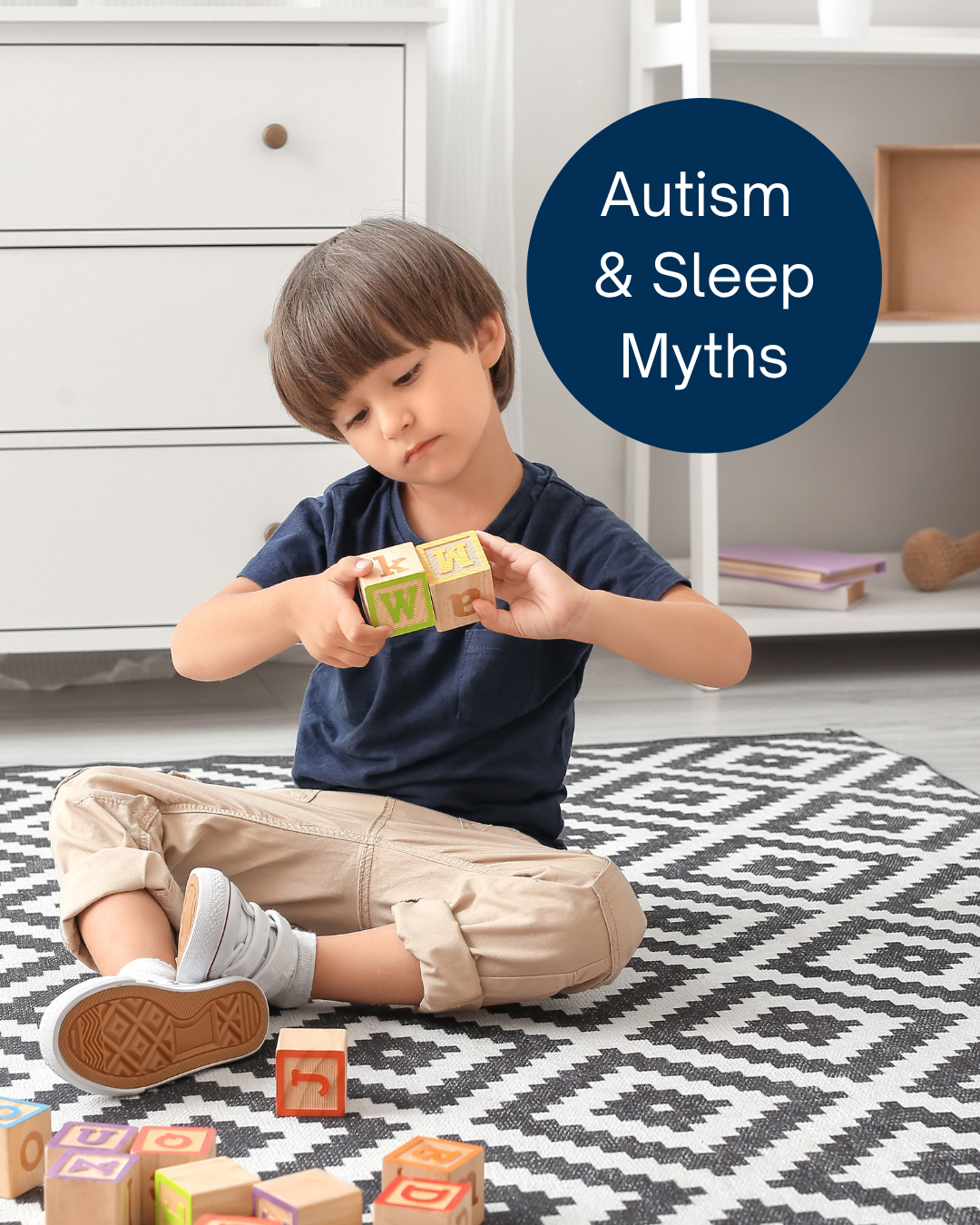Behavior & Development Blog
Evidence-based strategies and real-world solutions for families
Hey there! I'm Tiffany, and as a Board Certified Behavior Analyst, Certified Behavioral Sleep Specialist, and mom of three, I know firsthand that parenting advice needs to actually work in real life - not just in theory. Here you'll find practical strategies for sleep challenges, behavioral concerns, and daily parenting struggles. Whether you're navigating bedtime battles with a neurotypical toddler or supporting a child with autism through big emotions, I share approaches that respect your family's unique needs and values.
Every strategy I share is grounded in behavioral science but designed for busy family life. Because real families need real solutions that actually work.
Looking for personalized support?
Schedule a free discovery call to discuss how I can help your family.

It's Okay to Set Sleep Boundaries That Support Your Sleep Too
You can be a responsive, loving parent and hold boundaries around sleep. Your rest isn't selfish—it's necessary. Here's how to create sustainable sleep for everyone.

Why Bedtime Reward Charts Fail (And How to Make Them Actually Work)
Your bedtime sticker chart worked great for exactly three nights. Here's why most charts fail—and how to know if yours will actually help or just create more battles.

“Share Your Calm, Don’t Join the Chaos”… But What Does That Actually Mean?
That parenting quote about sharing your calm instead of joining the chaos? It's beautiful—and incredibly hard when you're exhausted and triggered. Here's how to actually do it, even when your own nervous system is activated.

New Year Sleep Goals That Actually Stick
Big sleep resolutions rarely work. Small, intentional changes do. Learn why gradual shifts in bedtime, routines, and consistency create lasting improvements—without the pressure of overnight transformation.

ADHD and Sleep: Why Your Child Can't Fall Asleep (And What Helps)
Why kids with ADHD can't fall asleep even with perfect routines - and what actually helps. Learn the Brain Dump Method for racing thoughts at bedtime. Step-by-step guide by BCBA.

How to Fall Asleep Fast For Kids
When your child is still wide awake 45 minutes after bedtime, it's natural to wonder what you're doing wrong. Research shows that typical sleep onset for children is 15-20 minutes. If your child consistently takes longer, there are concrete, evidence-based strategies that can help them settle faster - whether you have a toddler, preschooler, or school-age child.

The Holiday Sleep Survival Guide for Kids: Tips for Parents
Schedules shift, sugar multiplies, and suddenly bedtime feels like chaos. This realistic holiday sleep guide offers 8 practical strategies for families with kids ages 2-12—neurotypical and neurodivergent. Learn how to anchor routines, prevent meltdowns, and create a post-holiday reset plan. Because if sleep goes sideways this season, it's not you. It's the holidays.

Self-Compassion for Parents: How to Stop Burnout and Find Balance
Feeling burned out and overwhelmed? Self-compassion isn't just feel-good advice—it's one of your most powerful tools for breaking the parent burnout cycle. Learn 5 practical, science-backed techniques you can use right now to reduce stress, handle difficult moments with more ease, and build lasting emotional resilience.

When Morning Routines Fall Apart (And How We Get Back on Track)
Last week our morning routine completely fell apart. I was frustrated, the kids weren't listening, and we all left the house feeling stressed. If you've been there too, I'm sharing the strategies I'm using this week to turn things around.

How to Stop Co-Sleeping with Older Kids: Gentle Sleep Training Tips
If your child is still co-sleeping at age 5, 7, or even older, you're not alone, and there's absolutely no judgment here. Many families end up co-sleeping with older children much longer than they initially planned, and that's completely okay. But if you're feeling ready to help your child transition to independent sleep, this compassionate guide offers gentle, evidence-based strategies that honor your child's individual needs. As a certified behavioral sleep specialist, I'll share collaborative approaches that can help older children sleep confidently in their own space while supporting the whole family's rest—no power struggles required.

Positive Reinforcement Examples: A Complete Guide for Parents and Teachers
"Good job!" "Way to go!" Sound familiar? If these phrases don't motivate your child the way you hoped, you're not alone. Many parents use positive reinforcement instinctively, but without understanding how it truly works, it often falls flat—or worse, accidentally reinforces behaviors they didn't intend.
As a behavior analyst, I see this disconnect all the time. The difference between effective reinforcement and empty praise comes down to timing, specificity, and knowing what actually motivates your child.
This complete guide breaks down what positive reinforcement really means and how to use it effectively with children ages 2–12. You'll learn the five types of reinforcement beyond praise, common mistakes that undermine your efforts, and practical examples you can use at home and school today. Most importantly, you'll discover how to follow your child's lead and build environments where good choices feel good to make.

Sleep Regression 101: A Complete Guide for Toddlers and Preschoolers (Ages 2-5)
Is your previously good sleeper suddenly fighting bedtime, waking at night, or having meltdowns? Sleep regressions in toddlers and preschoolers are real, normal, and often more complex than baby sleep regressions. Learn the signs of true developmental regressions, age-specific triggers for 2, 3, and 4-year-olds, and evidence-based strategies to support your child through these temporary disruptions while maintaining healthy sleep habits for the long term.

When Do Kids Stop Napping? It's Complicated
Wondering when your child should stop napping? Most kids transition away from afternoon naps between ages 3-5, but the timing varies dramatically. Learn the specific signs that indicate your child is truly ready to drop their nap, how to adjust bedtime for success, and practical strategies for navigating preschool nap times when your child no longer needs to sleep.

Autism & Sleep Myths: What Parents Really Need to Know
If you're parenting an autistic child who struggles with sleep, you've probably heard all the myths: "They don't need much sleep," "You need to be stricter," or "Just try melatonin." The truth? Most sleep advice wasn't designed for neurodivergent brains. Learn what science actually tells us about autism and sleep, plus evidence-based strategies that honor how your child's unique brain works.

Back-to-School Sleep Transitions: Start Now (Your August Self Will Thank You)
School starts in just a few weeks, but sleep schedule changes don't happen overnight. This evidence-based 4-week plan helps you gradually shift bedtimes and wake times so your child is ready for school—without the last-minute battles. Learn why starting early makes all the difference and get a week-by-week timeline that actually works for real families.

Screen Time Battles at Bedtime: What's Really Going On (And How to End the Fight)
Tired of nightly screen time battles? Learn why evenings are especially challenging for kids and discover 6 research-backed strategies that actually work. From connection-based transitions to building "bridge activities," these approaches address the real reasons kids struggle to turn off devices. No more power struggles - just peaceful bedtime routines that teach self-regulation skills.

Why Consistent Bedtime Routines Fail (And What Works)
"Have you tried being more consistent?" If you're a parent struggling with sleep challenges, you've heard this advice countless times. But what if I told you that consistency alone isn't the solution? As a behavior analyst, I see parents implement perfectly predictable bedtime routines that still fail to improve their child's sleep. The problem isn't your dedication to routine - it's that maintaining the same approach without addressing the real barriers is like building a house on sand. Discover why "just be consistent" advice falls short and learn the strategic approach that actually works for families dealing with bedtime battles, night wakings, and sleep resistance.

You're Not Alone: What 103 Families Want You to Know
I surveyed 103 parents in our community about their biggest parenting challenges and what kind of support they actually want. The results were eye-opening: 57% struggle with supporting their kids through big emotions, 54% desperately need time for self-care, and 53% are battling screen time issues. But here's the most encouraging finding - if you've been thinking about getting some support but haven't taken that step yet, you're in great company. 42% of parents feel the same way. If you're feeling overwhelmed or alone in your parenting struggles, this research shows you're absolutely not. Discover what local families really need, see how your experiences connect with others, and find practical steps you can take today to feel more supported and less isolated.

The Science of Sleep Pressure: How to Make Bedtime Easier
Is bedtime a battle in your home? Understanding sleep pressure - your child's biological need for sleep - might be the missing piece. This post explores the science behind those second winds and bedtime meltdowns, offering practical ways to work with your child's natural rhythms instead of against them. Whether you're dealing with a typical toddler or a child with more complex sleep needs, these evidence-based strategies can help transform those nightly struggles into smoother transitions.

Why Traditional Sleep Advice Fails Neurodivergent Kids (And What Actually Works)
It's 3 AM, and there you are—bleary-eyed, scrolling through yet another sleep article on your phone while your child has finally dozed off beside you. If you're raising a neurodivergent child and traditional sleep strategies aren't working, it's not you. It's not your parenting. And it's certainly not your amazing child. The truth? Those traditional sleep approaches simply weren't designed with your child's unique brain in mind. Discover why melatonin functions differently, how sensory processing affects sleep, and what behavioral approaches actually work for children with autism, ADHD, and sensory differences.
Serving families with children ages 2-12 in Columbus, Dublin, Powell, Westerville, Worthington, Delaware, Grove City, Upper Arlington, and throughout Central Ohio and nationwide via telehealth, with specialized expertise in supporting children with autism, ADHD, and other developmental differences.
